- Home
- Dyrk Ashton
Paternus Page 18
Paternus Read online
Page 18
Zeke tries to help. “Peter, come on guy, we have to go, right now!”
There’s a BANG from the elevator shaft and the sounds of shredding steel.
As Zeke tugs on Peter’s wrist to break his hold on Fi, Peter releases one of Fi’s hands, then, fast as a striking snake, snatches Zeke’s.
“Jesus!” Zeke shouts. Peter’s grip is like iron.
Peter rocks back and forth, gasping for breath, mouth contorting.
“Peter, they’re coming!” Fi pleads. “We have to go!”
The racket from the elevator is getting louder.
Fi and Zeke attempt to pry Peter’s fingers away. It’s no use.
Then Peter speaks.
“H-a-a...” His voice is barely a whisper but the sound hits Fi like the report of a gunshot. “...h-a-a-ve... to g-o-o-o...”
“My God...” Fi exclaims. “Yes!” She sobs, a tear streaming down her cheek. “We have to go!”
There’s a great shearing of metal from inside the elevator. The doors BOOM and shudder.
Peter says, “G-o-o... with m-e-e?”
“Yes!” Fi cries. She snuffs hard, tears coming faster, touches the wetness on her cheek with her free hand. How can this be?! She doesn’t remember the last time she cried. She didn’t even cry at her mother’s funeral. But she’s crying now, and after everything that’s happened, it feels good. Really good. “Yes, Peter! We have to go, with you!”
Peter squeezes his eyes shut, expressing his own welling tears. He’s fighting, fighting hard, striking at the brambles in his mind, heaving on the barbed wire, flailing at the clinging fog.
BANG! The elevator doors shake harder.
Peter’s lips twitch and he manages to emit an audible “S-s-s-s...” Unseen by Fi or Zeke, his right foot inches forward on the foot-rest of the wheelchair. He presses his lips tight, then opens them again, the “S-s-s-s-s” coming stronger.
“Peter,” Fi reassures, wiping tears from her eyes with her free hand then placing her palm gently to the side of his face. “Don’t be sorry!”
More clearly now, “S-s-s-s...”
“There’s nothing to be sorry about!”
Another louder BANG and Zeke sees the elevator doors bow from within. “Fi, we’re just going to have to carry him!”
“S-s-s-s...”
The elevator doors buckle.
Fi pleads, “Peter...”
Peter looks into Fi’s eyes. His foot rises laboriously, creeping forward.
“S-s-s-slip.”
His foot hits the floor.
* * *
The red-eyed man rips open the crumpled elevator doors and shoves himself through.
At the other end of the hall, the door shatters inward. Max comes bounding through but halts suddenly, causing Hedwig and Curt to almost tumble over him from behind. Kleron pushes past them and glares toward the red-eyed man.
There’s nothing in the hallway between them but Peter’s empty wheelchair. It creeps backward, squeaking softly, and comes to rest against the wall.
CHAPTER FIFTEEN
Order of the Bull 6
The Lair of the Bull is a shambles. All is silent except for the rush of gas from broken lamps on the walls. Flames still burn in remaining lamps and lick at the fireplace hearth.
On the terrace outside, the head and body of Arges lie motionless beneath softly falling snow and moonlight. Far below, torch bearing monks scurry about the ruined monastery like frantic swarming fireflies.
Suddenly the hall belches a fireball of tremendous proportion, a concussive CRACK! and BOOM! that shakes the mountain to its core. The entire cavern collapses and the mountainside crashes down in an avalanche of dust and stone.
* * *
Hunched next to his duffel bag on the landing of the tunnel stairs, head in his hands, Tanuki swears he can still hear the horrible laugh of Xeco, the Terror Bird. How long he’s been sobbing here in grief he doesn’t know.
Arges is dead. The fabled cyclops, metalsmith and armorer to the ancients. The original Hephaestus, so badly maligned by the petit gods of Hellas.
Asterion, gone. Mighty Apis, whom the ancient Egyptians knew as the Herald of Ptah, a living manifestation of Amun, the first being, who according to their myths was self-created, without mother or father. Whatever the stories say, Tanuki knows that for many thousands of years The Bull was never far from Ptah’s side. In India it was the same. Long before the Vedic Period, when The Bull was called Nandi, he was the right hand of Shiva. As Vohu Mazda, the Zoroastrians believed him to be a divine spark of Ahura Mazda, an aspect of creation itself.
The tunnel shakes abruptly, accompanied by a deep rumble. Tanuki grabs the wall and holds on until the tremors cease. Dust loosed from cracks hangs silently in the air. The Lair of the Bull is gone, Tanuki presumes. But what does it matter? My brothers are dead! He sobs harder. What am I going to do?!
The words of Arges come ringing back, “Find him, if you can! Tell him what has happened here!”
Tanuki takes a deep uneven breath, rubs the tear-soaked fur of his face, and braces himself.
However it turns out, whatever the consequences, Tanuki will find him, and tell him everything. He grabs up his duffle, throws the straps over his shoulders to carry it like a backpack, clutches his staff, and bounds down the stairs.
He will find Ptah, Amun, Shiva, Ahura Mazda, or whatever he might be calling himself these days. For Arges, for Asterion, he will find Father.
PART TWO
CHAPTER SIXTEEN
Il Capro
“There is nothing more difficult to take in hand, more perilous to conduct, or more uncertain in its success, than to take the lead in the initiation of a new order of things.”
(Il Capro, as told to his pupil,
Niccolò di Bernardo dei Machiavelli)
Things have not turned out quite as expected.
It’s a good thing he didn’t have a plan. Plans are inflexible. They can go wrong. That’s why he tries not to make them.
But at this very moment, Baphomet simply can’t move. He doesn’t feel the bindings of rope or chain. Then again, he doesn’t feel anything. He’s not even sure he’s breathing. No sense of smell, taste or touch. He thinks he can hear a distant droning, a soft thrum in his inner ear—and is that a sniffle, from far away? A whimper?
Oh dear, I hope I’m not making that sound. If it is a sound...
His eyes perceive nothing. They may be closed, he just can’t tell. He tries to rationalize his blindness. He’s either in complete absence of light, hooded, under a spell, or dead...
Is this it? The hereafter? Or is he waiting in some limbo of sensory deprivation for the afterlife to begin? Perhaps it will be a new life...
I’m losing my mind...
Cogito ergo sum! (I think, therefore I am!). The parvuli may credit Descartes for that, but he didn’t come up with it. Hell, I, The Goat, heard it when I was a kid. He chuckles in his head. “Goat,” “herd,” “kid.” I think I laugh, therefore I am—amused...
Insanity. Maybe he is losing himself, his personality being erased as his life essence prepares for rebirth—as a fungus, an amoeba or slug most likely, if karma holds true, given the manner in which he’s lived this life. Perhaps he will be a kinder, gentler slug...
His brilliant mind, slipping away, what truly makes him The Goat, even more than his magnificent horns (which he does love dearly). An individual. Distinct. One of a kind. I think, therefore I am—Baphomet!
How did it come to this? Whatever this is?
Think! Reason! Rational thought! Logic!
And The Goat knows logic. Oh yes. His grasp of it far exceeds the meager accomplishments of the parvuli. But logical examination, though a marvelous exercise, will only get one so far. A warm up to the real game. Strategy. And that is where Baphomet truly shines. Anyone can plan, but a good strategist thrives under conditions of uncertainty, views setbacks not as failures but fresh opportunities to reexamine probabilities, reevaluate possibilities, adapt t
o emergent contingencies and exploit them to his advantage. Remain flexible in all things. Keep the bigger picture in mind. And expect the unexpected.
The drawback of most parvulus approaches to strategic theory is that rationality and logic are taken as givens. Far more fascinating is the irrational, and superior to logic, the illogical. It may not be scientific, but it’s infinitely more compelling. Mathematical probability goes out the window. Intuition takes over. In a way, one must have faith. Faith in oneself. A shrewd gut, phenomenal instincts, transcendent inspiration, authentic natal impulse, as well as cunning, cynicism and duplicity. These are the tackle of the true schemer.
When it comes to strategy, The Goat has few equals. Father is, well, Father, and Myrddin Wyllt was a force to be reckoned with. Asterion isn’t bad. Calculating, decisive, but insipidly predictable. More of a tactician, really. Ganesh would be a worthy opponent if he took an interest in such things. But they are all hampered by their beliefs, hobbled by the two greatest impediments to conceiving and implementing truly effective plots. Ethics and morality.
Ethics can be dispensed with entirely as far as Baphomet is concerned, and the master strategist’s morals must be both pragmatic and pliable.
And Master Kleron? Moral issues don’t concern him, obviously. He’s one of the greatest strategists of all time, as was his master before him. But he suffers from another tragic hindrance to the design of genuinely exceptional stratagem, a most deadly Achilles heel (that boy did have bad feet). Kleron has a cause. So did his master. Undeniably brilliant, both of them. They each mounted the most ambitious campaigns this world has ever seen in the forms of the First and Second Holocausts. But they lost.
The Goat played no small part in both those debacles. Yet here he is, on the same side again...
Baphomet blinks—and he feels it—cogitation is doing the trick! He still can’t move freely or see, and he has no idea where he is, but his wits are returning. And he remembers. He’s not dead, in no ethereal limbo.
He’s a prisoner.
He recalls clearly now, the mission with Ao Guang and Dimmi. The cave of purple obsidian, and his own final words before he blacked out—Mother Witch.
Now that his brain’s synapses are firing at full capacity there are many things to consider. But most critically—how am I going to worm my way out of this one? What nefarious scheme, what devious plot, can he possibly devise against her?
CHAPTER SEVENTEEN
Flowers & Figs 7
Fi and Zeke have stepped on glare ice, both of them feeling that jolt of adrenaline that comes at the instant when all traction is lost, when you realize you’re going down hard and there’s absolutely nothing you can do about it. And they can’t see anything. Nothing but gray.
Then the gray is gone, an ethereal curtain ripped aside. They regain their footing, hearts pounding, and they almost do fall.
Peter is still between them clasping their hands, but his wheelchair is gone. They struggle to keep their balance, pulling him up and clutching him between them in a hug. They look at each other in amazement, their faces only inches apart over his shoulder.
“What was that?!” Zeke exclaims.
Fi shakes her head frantically. “I have no idea!”
They take in their surroundings. They’re still in the hall on the fifth floor of the hospital. Sort of.
The paint on the walls is peeling, the tile on the floor cracked, half of it missing. No lights are on, what illumination there is comes from a broken window at the end of the hall. The few doors that remain on the patient’s rooms hang loosely on broken hinges. Mildew stains the walls, water drips through moldy cracks in the ceiling. They jump at the whistling wing-flap of a pigeon flying in the window. It spies them and wheels around, retreating back the way it came.
Fi searches the face of the frail old man between them but it offers no answers. His eyes are vacant and cloudy as ever. “Peter?”
He grips their hands harder. “S-s-slip.”
Gray fog, frantic scrabbling to gain purchase on the nothing beneath their feet, then the mist disappears once more. Pounding rain under a dark stormy sky—and now they are falling.
They flail in the air, screaming as they plummet.
Plunging into dark water, bumping the bottom, pushing upward, dragging Peter with them, reaching the surface.
Zeke gasps, “Fi!”
She sputters, “I’m right here!” and points to the edge, thirty feet away. “Swim!”
Paddling and kicking, towing Peter between them, keeping his head above water the best they can. Reaching land and crawling up the slick muddy slope, rain pelting. They drag Peter to shore and lift him from the ground, their bodies buzzing from shock and exertion.
They appear to be standing in an excavation site, but there is no equipment and there are no people. Then bursts of lightning reveal the buildings around them—tumbled, charred, twisted—and the water-hole looks more like a bomb crater.
“S-slip.”
Gray fog, no traction, sliding, slipping.
* * *
They jerk as their shoes catch on solid ground. This time the grayness gradually dissipates. Wind gusts and recedes. Wisping lacy fog veils and unveils their surroundings. The sky is a milky white ceiling that illuminates everything in a flat even glow. Powdery white sand swirls in eddies at their feet. Silvery windswept dunes extend as far as the eye can see, then fade into a pale haze.
Neither Fi nor Zeke have any sense of temperature, and though the wind moves their hair and wet clothes they can’t feel its touch. Sounds and scents come to them on the unfelt breeze. Each sound, each smell, is individual, distinct, but indiscernible from one another. There’s wind and lapping water, but they also hear music, birds, traffic, voices, all mingling as if from a great distance. Each voice is vaguely familiar—they’ve heard the words before, spoken by people they know and have known, but if they concentrate on any of them they’re gone.
They see the look of amazement on each other’s faces. Then Fi realizes they are alone. “Peter...”
He’s no longer between them.
They scan the landscape for any sign of him, spin to search behind them, and realize they’re standing on something like a beach.
Before them is what looks like a cold, arctic ocean. A heavy vapor hugs its surface. Waves the color of weak milk crest and recede between glinting flows of ice, which form, then sink, form, and sink, in rapid succession. Across this expanse, at a distance impossible to determine, is a vast range of mountains, glittering crystal peaks piercing the cloud-covered sky. But the mountains move, avalanching into the sea as new peaks are thrust upward to replace them in a constant cycle of destruction and renewal.
A cloud of low fog wafts aside. Twenty yards away, a wilted figure in a sleeping cap and ratty blue robe is dragging himself toward the white sea.
Fi and Zeke shout at the same time, “Peter!”
They charge toward him, but their feet sink in the sand. Fi falls forward, her hand going deep. She forces herself upright, tugging her arm free, but her feet sink further.
Peter crawls into the surf. She calls out, “Peter!!!”
Zeke pulls one foot after the other from the sand, fighting toward Fi, grunting with every step. They reach for each other and grasp hands.
“Come on!” Fi shouts.
Using one another for balance, they trudge forward in the sucking sand. Ahead of them Peter flounders, then pushes himself to stand waist deep on wobbling legs and wades further out. The muscles of Zeke’s thighs are burning. “Peter!”
“Peter! Stop!” Fi cries.
He topples forward and plunges beneath the surface.
Fi shrieks, “PETER!!!” She clenches Zeke’s hand, and with renewed effort pulls him with her. She groans through clenched teeth as together they plow their way to the surf.
When they finally reach the edge there’s no sign of Peter. Zeke pulls back on Fi’s hand in hesitation.
She releases her grip. “I’m going,”
she says resolutely, and wades in.
Zeke sets his jaw and follows. The ground becomes more solid under his feet as he enters. Instead of icy cold, a strange warmth rises over his ankles, up his legs to his waist. His hand touches the surface. It isn’t wet, more like incredibly dense steam than water. Fi dives. Zeke groans, takes a step further, and drops unexpectedly into the depths.
The light is dim, the same all around, and there are no bubbles by which to orient himself. He thrashes and kicks, weightless in the swirling gray. His head pounds with his heartbeat. The sound of blood rushes in his ears. His lungs scream for air. He thrashes harder, hoping for a glimpse of Fi or Peter. Nothing but gray. He can’t hold his breath any longer.
This is it!
His mouth pops open against his will and he inhales deeply.
A blinding burst of white light, followed by a dizzying progression of sights, sounds, smells, and tastes. He’s bombarded with emotions—thoughts—ideas—dreams—heat—cold—comfort—pain—sadness—ecstasy—loneliness—joy—rage—terror. He sees and feels everything he’s ever experienced, everyone he’s ever known, everywhere he’s ever been. In a dizzying montage he’s reliving his entire life, all out of order, jumbled like pieces of a jigsaw puzzle tumbling through space. One image suddenly stands out, though it’s fuzzy, as if seen through foggy glasses.
A soccer field. A young girl, no more than five or six, in oversized shin guards. She kicks the ball, looks right at Zeke, and smiles. The soccer ball pings off her head of wild red hair and she’s bowled over by a throng of players.
Zeke squeezes his eyes shut. The girl’s gone, but images assail him faster and faster, the sounds getting louder and louder. He presses his hands to his head to keep it from splitting open and screams, but there is no sound.
Something touches his hand, solid and real.
He opens his eyes. Centered in the blitz of images is Fi’s face, obviously shouting at him, though he doesn’t hear her. She grabs his wrist with both hands and pulls.

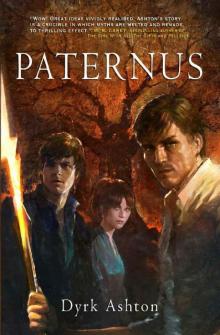 Paternus
Paternus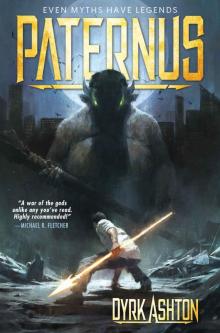 Paternus: Rise of Gods (The Paternus Trilogy Book 1)
Paternus: Rise of Gods (The Paternus Trilogy Book 1)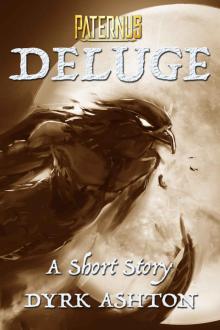 Paternus: Deluge, A Short Story
Paternus: Deluge, A Short Story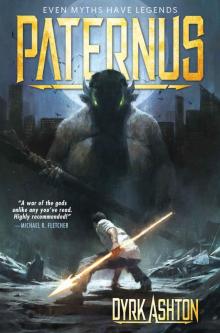 Paternus_Rise of Gods
Paternus_Rise of Gods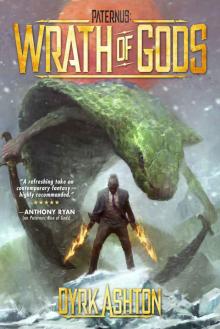 Paternus: Wrath of Gods (The Paternus Trilogy Book 2)
Paternus: Wrath of Gods (The Paternus Trilogy Book 2)